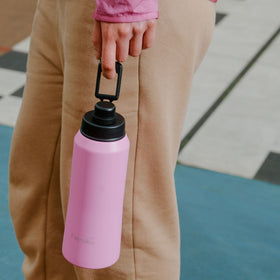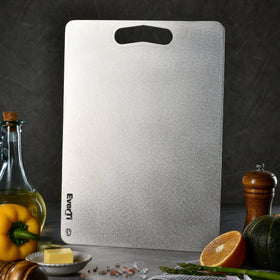
Don't Be Fooled! We Bust 9 Myths About So Called “Eco” Products
Before we bust any eco myths, what exactly are green products? According to Feedough:
“green products are usually identified by having two basic goals – reducing waste and maximizing resource efficiency. They are manufactured using toxic-free ingredients and environmentally-friendly procedures and are certified by recognized organizations like Energy star, Forest Stewardship Council, etc.”
Consumers are becoming more aware of green products. And they're looking into the ingredients in the products they're buying. But companies are also getting better at using marketing speak. They continue to try to convince us that the greenwashed products they're selling are good for you and the environment. But in reality, their production or disposal isn’t great for the planet.
Working your way through the greenwash means that you need to have a sharp eye for these sneaky marketing tricks.
So, let's bust some myths about green, eco friendly products:
Common sustainability myths around green products
Myth 1: Natural means ingredients come from nature.
"Natural. Existing in or caused by nature; not artificial."
That's according to the Oxford English Dictionary. However, when it comes to food and skincare products, that's not exactly the case. The word 'natural' is not regulated, and anything with 'natural' or 'nature' in the product name can contain non natural ingredients, including synthetics and even harmful toxins.
Even natural flavour means ingredients can be ‘nature identical’, which is to say, still synthetic. Which means that you need to read the ingredients list on the back of the label, and ignore the front of the label where all the marketing guff is.

Myth 2: Organic products are better.
"Organic. Produced or involving production without the use of chemical fertilizers, pesticides, etc."
That's according to the OED. Yet when it comes to food and skincare products, once again, the word organic itself is not regulated. A product called 'Charlie's Organic Wondercream' for example may not include a single organic ingredient, and that's completely legal.
How do you check that what you are buying is truly organic, and that you’re getting the best eco friendly products? Look for independent organic certifications. And even then, read the ingredients.
Read more: Buying Organic on a Budget
Myth 3: Degradable and Biodegradable are the same thing.
Biodegradable means that the entire product can "degrade to the point where microorganisms can completely metabolize them to carbon dioxide, water, biomass & mineral salts." Biodegradable bags, for example, are usually made from renewable resources.
Degradable means that the plastic has an additive that makes the plastic break down into smaller pieces when exposed to light, heat, and air. These kinds of plastics are called photodegradable or oxo degradable plastics. They won't entirely biodegrade when they're buried in landfills or compost because there's no light and air. What you'll end up with are lots of small pieces of oil based plastic that won't break down completely.
Fragmentation is not the same as biodegradation. The small pieces of plastic from degradable plastic are causing problems in our marine environments. There are independent certifications for biodegradability. So, if you are looking for biodegradable, look for one of these:
- EN13432/EN14995 Compostability mark: VINÇOTTE (Belgium)
- ASTM D 6400 Compostability mark: BPI - BioPolymer Institute (USA)
- EN13432 Compostability mark: DIN CERTCO (Germany) and ABA (Australia)
Wherever possible, go for reusable rather than single use items. Even if the product is biodegradable, the resources required to make a single use item are huge.
Read More: Eco Nappies: Are They Really Biodegradable?

Myth 4: BPA free is safe.
You see it everywhere now. There are BPA free drink bottles, sippy cups, lunch boxes, and even blenders. BPA became newsworthy. There was a public outcry and the manufacturers responded. But what they didn't tell us is that one of the plasticisers they've switched to is Bisphenol-S.
Bisphenol-S is similar in structure to BPA. But we don't know enough about it yet to determine whether it's any safer than BPA. In fact, early research suggests it may even be worse than BPA because it's not as biodegradable. It's more heat stable, suggesting that the same hormone mimicking properties don't degrade as quickly as BPA. It means that it may accumulate in the body.
What's the answer? Go for sustainable living. Avoid plastics where possible and choose stainless steel, glass, and ceramic instead.
Myth 5: Fragrance free contains no fragrance.
There's no standard definition for fragrance free or unscented. It actually means 'no detectable odour'. But scents can still be added to 'fragrance free' products to cover up the smell of other chemicals. And due to trade secret laws, companies don't have to disclose what makes up their fragrance.
Because of this, fragrance is one of the ingredients that's highly recommended you skip when it comes to personal care. That's why you need to read the ingredients list. Look for fragrance, parfum, or perfume, and choose different eco friendly brands if you see it there. If the scent is made using essential oils, you're okay unless you have a sensitivity to those oils.

Myth 6: Chemical free is better.
Don't start me on the phrase 'chemical free' because I start ranting. There’s no such thing as chemical free. Everything is made of chemicals: the air you breathe, the water you drink, you! Somehow this completely incorrect phrase has come to mean free of toxic chemicals. However, not all chemicals are toxic, and not all 'chemical-free' products are safe. It's just another meaningless phrase that marketers are trying to confuse us with.
Myth 7: Eco friendly is better.
What is eco friendly? The materials used? The manufacturing process? The cradle to grave impact of this product compared to another product? Once again, it doesn't mean anything unless you know what you're looking for. Beware of products with packaging that claims it's eco friendly. Unless it's backed up by an independently certified ecolabel from the likes of GECA, the EU Ecolabel, or the Nordic Swan Eco Label.
Read more: 52 Great Ideas for Green Living
Myth 8: Moving to eStatements is going 'green'.
Companies use and abuse this term all the time. We receive just about everything via email these days. Sure, it's saving paper. But that doesn't equal an environmentally friendly company. It takes a little more than an e-statement, in my opinion, to be called a green initiative in the corporate world.
Once again, take 'green' words on corporate marketing paraphernalia with a grain of salt. I once read about a soap company that claimed to help save wildlife. It turned out that they simply donated antibacterial soap to rescue groups to help clean up animals after oil spills. Only the product they were donating actually contained ingredients harmful to animals.
So don't romanticise all the green terms you see on a product label. A little healthy scepticism goes a long way on your journey to greener living.

Myth 9: Naturally derived
Naturally derived is another confusing term. It just means a natural ingredient, for example coconut, is mixed with a synthetic one to create an entirely new ingredient.
Cocamidopropyl betaine is one such ingredient. It's not natural, but it’s synthetic. It can be an irritant because there may be contaminants left after the chemical processing. Although it can be processed to remove the contaminants. It's allowed in skincare products by EcoCert. But it's not allowed by ACO (Australian Certified Organic).
A 'naturally derived' ingredient in a product is only one of many myths. So, don't be fooled.
Debunking another eco myth: local is always best
One study concluded that importing New Zealand lamb to the UK had a lower carbon footprint versus lamb grown in the UK. At 688 kg CO2/Tonne carcass, compared to 2,849 in the UK, New Zealand's CO2 emissions were lower compared to the UK.
Food miles are one way to measure things. But it’s not the only consideration. There are other factors to consider like, how and where a product is produced.
It seems to make environmental sense to buy local products when possible. But it isn't always true that local is always best.

Why should we use eco friendly products?
Truly eco friendly products are better for the environment. They can be cheaper in the long run and often come with health benefits.
But you have to make sure that what you’re buying is actually green. Companies will spend money and energy convincing you to buy their goods. But some businesses aren't always honest about their dealings.
So go through your checklist. Make sure you’re getting eco friendly products, so that you’re getting what you think you’re paying for.
By making a conscious effort to use green things, we can all help make our world a cleaner and healthier place.
Buy truly sustainable products
Buying green items is worth paying for. Not only are you helping the environment, but you're also supporting companies that prioritise sustainability. So before you go out and buy your next item, make sure to check if it's eco friendly. If it is, go ahead and add it to your cart!










